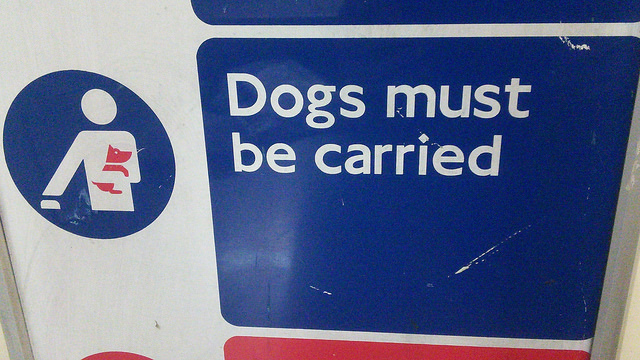You know when something doesn’t quite mean what it’s supposed to mean? At least not when it’s read in a lawyerly way? I may post some examples as I come across them – but thought I really had to begin with what may be the all-time classic, from London Underground.
What if you’ve got no dog?
Feel free to e-mail me with a photo if you see any good ones.
Carl Gardner2014-04-14T14:46:52+00:00

No, I’m not buying that one, Carl. It’s a perfect example of an instance where the passive voice has a clear advanatge over active.
It doesn’t say that “all passengers must carry a dog”. It says “Dogs must be carried [when here].”
And to think that you postponed a meeting with me this afternoon so that you could write this.
Not to hog this page, but I’ve just spotted some dodgy drafting. This isn’t technically an email, but it does come with a photo. [Think about it …]
I know. But it is a classic! And I wrote it earlier than you think.
Sorry – I agree with Carl’s original reading. If it had read “Hard-hats must be worn” or “Valid tickets must be presented on demand”, the expectation (and I suspect, court interpretation) would be that failure to comply was wrong, and “I have no hard-hat” or “I have no ticket” would be no defence.
Enemy, I don’t think much of your examples at all.
Your second example only gets off the ground, so to speak, because, by its very construction, it applies to those persons to whom a demand is made. But, on your argument, the requirement would apply equally to train company employees and regardless of who made the demand (including passengers). Can’t see a court enforcing that.
Furthermore, on what basis would a court penalise a passenger for failing to present a ticket if they had one? It seems to be, at most, a breach of contract – and then only if the term was disclosed in the conditions prior to purchase.
Finally, I’ve never seen a sign demanding that hard hats must be worn on a train. Can’t honestly see a court enforcing that, either. 🙂
Failing to show a train ticket on demand is an offence contrary, IIRC, to Railway Byelaw 18. It is not a defence that one had a ticket, and it wouldn’t really make sense for that to be the case. It would make a mockery of ticket inspections if it were permitted to say “I’ve got a ticket, but I’m not going to show it to you.”
Now, where did I put my anorak?
Thanks, Jon. Makes a lot of sense. Moreover, the Railway Byelaws are written in the active voice (“A person shall hand over his ticket … “) not “Valid tickets must be presented on demand …” and not by way of a brief sign with all the ambiguities inherent in the example given by Mortals Chiefest Enemy, above.